Value Chain Analysis of Telstra: Operational Efficiency and Customer Relationships
VerifiedAdded on 2023/01/17
|13
|1422
|54
AI Summary
This report analyzes the value chain of Telstra, focusing on its operational efficiency and customer relationship strategies. It discusses the company's inbound and outbound logistics, marketing and sales efforts, and customer support services.
Contribute Materials
Your contribution can guide someone’s learning journey. Share your
documents today.
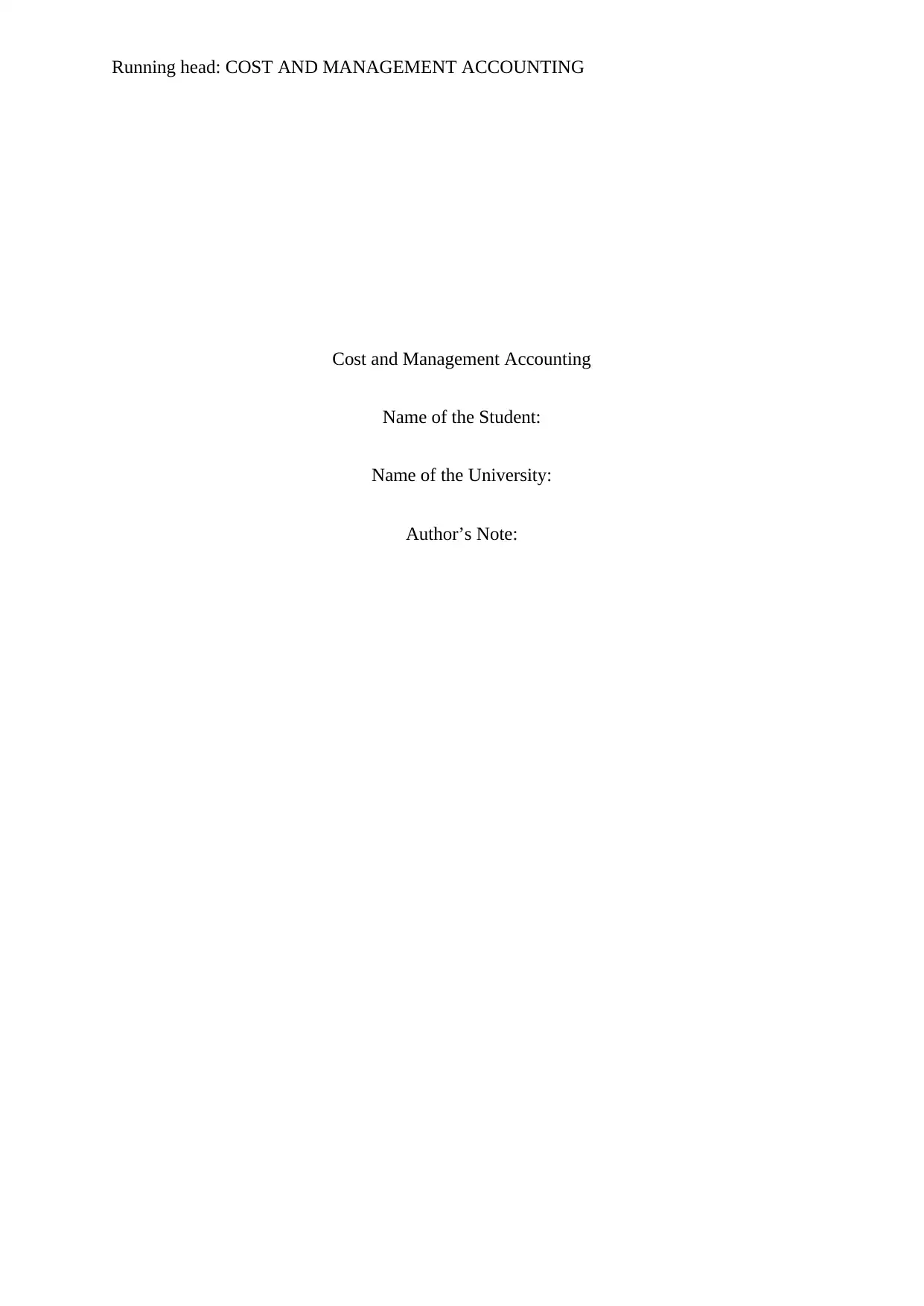
Running head: COST AND MANAGEMENT ACCOUNTING
Cost and Management Accounting
Name of the Student:
Name of the University:
Author’s Note:
Cost and Management Accounting
Name of the Student:
Name of the University:
Author’s Note:
Secure Best Marks with AI Grader
Need help grading? Try our AI Grader for instant feedback on your assignments.
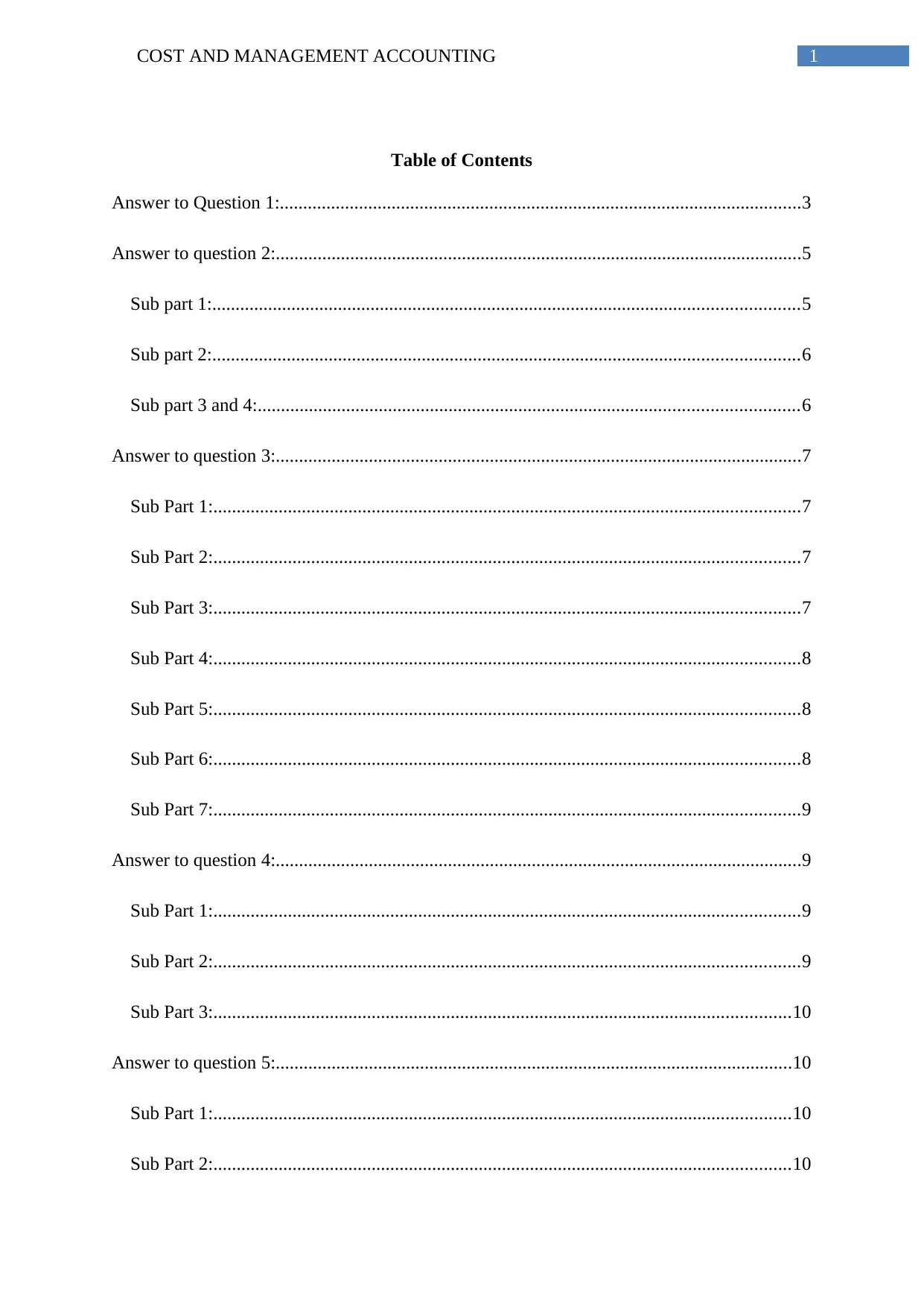
1COST AND MANAGEMENT ACCOUNTING
Table of Contents
Answer to Question 1:................................................................................................................3
Answer to question 2:.................................................................................................................5
Sub part 1:..............................................................................................................................5
Sub part 2:..............................................................................................................................6
Sub part 3 and 4:....................................................................................................................6
Answer to question 3:.................................................................................................................7
Sub Part 1:..............................................................................................................................7
Sub Part 2:..............................................................................................................................7
Sub Part 3:..............................................................................................................................7
Sub Part 4:..............................................................................................................................8
Sub Part 5:..............................................................................................................................8
Sub Part 6:..............................................................................................................................8
Sub Part 7:..............................................................................................................................9
Answer to question 4:.................................................................................................................9
Sub Part 1:..............................................................................................................................9
Sub Part 2:..............................................................................................................................9
Sub Part 3:............................................................................................................................10
Answer to question 5:...............................................................................................................10
Sub Part 1:............................................................................................................................10
Sub Part 2:............................................................................................................................10
Table of Contents
Answer to Question 1:................................................................................................................3
Answer to question 2:.................................................................................................................5
Sub part 1:..............................................................................................................................5
Sub part 2:..............................................................................................................................6
Sub part 3 and 4:....................................................................................................................6
Answer to question 3:.................................................................................................................7
Sub Part 1:..............................................................................................................................7
Sub Part 2:..............................................................................................................................7
Sub Part 3:..............................................................................................................................7
Sub Part 4:..............................................................................................................................8
Sub Part 5:..............................................................................................................................8
Sub Part 6:..............................................................................................................................8
Sub Part 7:..............................................................................................................................9
Answer to question 4:.................................................................................................................9
Sub Part 1:..............................................................................................................................9
Sub Part 2:..............................................................................................................................9
Sub Part 3:............................................................................................................................10
Answer to question 5:...............................................................................................................10
Sub Part 1:............................................................................................................................10
Sub Part 2:............................................................................................................................10
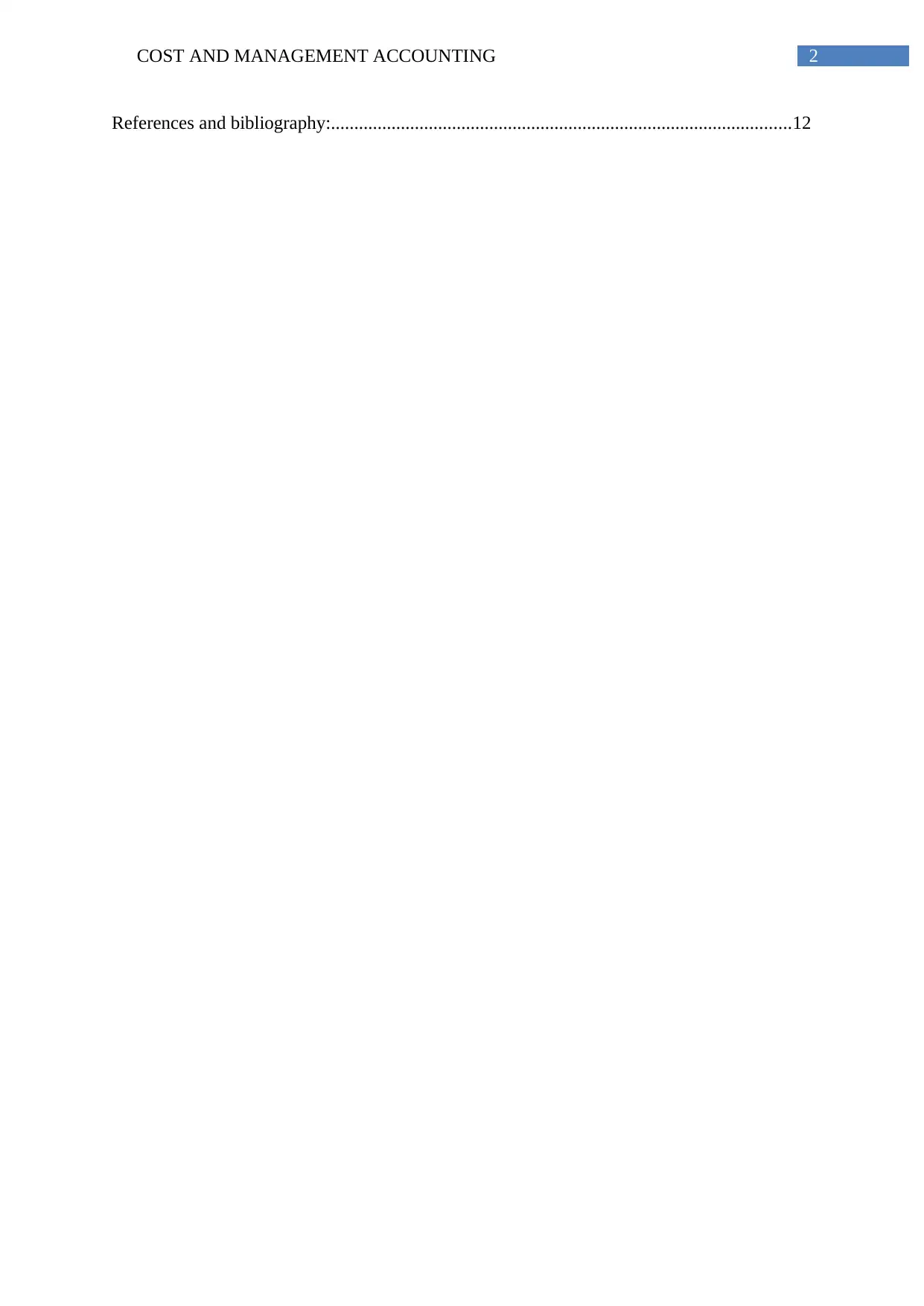
2COST AND MANAGEMENT ACCOUNTING
References and bibliography:...................................................................................................12
References and bibliography:...................................................................................................12
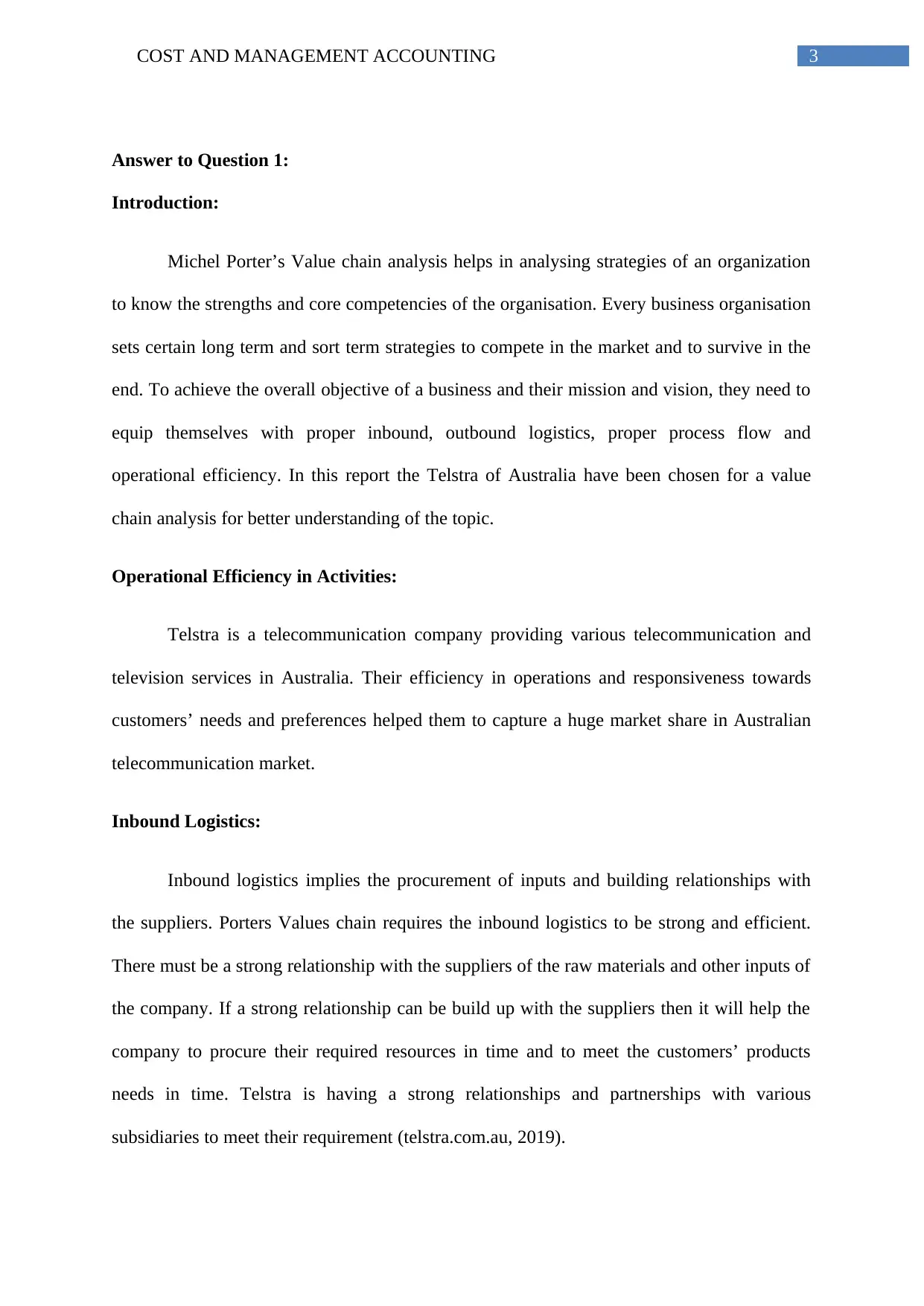
3COST AND MANAGEMENT ACCOUNTING
Answer to Question 1:
Introduction:
Michel Porter’s Value chain analysis helps in analysing strategies of an organization
to know the strengths and core competencies of the organisation. Every business organisation
sets certain long term and sort term strategies to compete in the market and to survive in the
end. To achieve the overall objective of a business and their mission and vision, they need to
equip themselves with proper inbound, outbound logistics, proper process flow and
operational efficiency. In this report the Telstra of Australia have been chosen for a value
chain analysis for better understanding of the topic.
Operational Efficiency in Activities:
Telstra is a telecommunication company providing various telecommunication and
television services in Australia. Their efficiency in operations and responsiveness towards
customers’ needs and preferences helped them to capture a huge market share in Australian
telecommunication market.
Inbound Logistics:
Inbound logistics implies the procurement of inputs and building relationships with
the suppliers. Porters Values chain requires the inbound logistics to be strong and efficient.
There must be a strong relationship with the suppliers of the raw materials and other inputs of
the company. If a strong relationship can be build up with the suppliers then it will help the
company to procure their required resources in time and to meet the customers’ products
needs in time. Telstra is having a strong relationships and partnerships with various
subsidiaries to meet their requirement (telstra.com.au, 2019).
Answer to Question 1:
Introduction:
Michel Porter’s Value chain analysis helps in analysing strategies of an organization
to know the strengths and core competencies of the organisation. Every business organisation
sets certain long term and sort term strategies to compete in the market and to survive in the
end. To achieve the overall objective of a business and their mission and vision, they need to
equip themselves with proper inbound, outbound logistics, proper process flow and
operational efficiency. In this report the Telstra of Australia have been chosen for a value
chain analysis for better understanding of the topic.
Operational Efficiency in Activities:
Telstra is a telecommunication company providing various telecommunication and
television services in Australia. Their efficiency in operations and responsiveness towards
customers’ needs and preferences helped them to capture a huge market share in Australian
telecommunication market.
Inbound Logistics:
Inbound logistics implies the procurement of inputs and building relationships with
the suppliers. Porters Values chain requires the inbound logistics to be strong and efficient.
There must be a strong relationship with the suppliers of the raw materials and other inputs of
the company. If a strong relationship can be build up with the suppliers then it will help the
company to procure their required resources in time and to meet the customers’ products
needs in time. Telstra is having a strong relationships and partnerships with various
subsidiaries to meet their requirement (telstra.com.au, 2019).
Secure Best Marks with AI Grader
Need help grading? Try our AI Grader for instant feedback on your assignments.
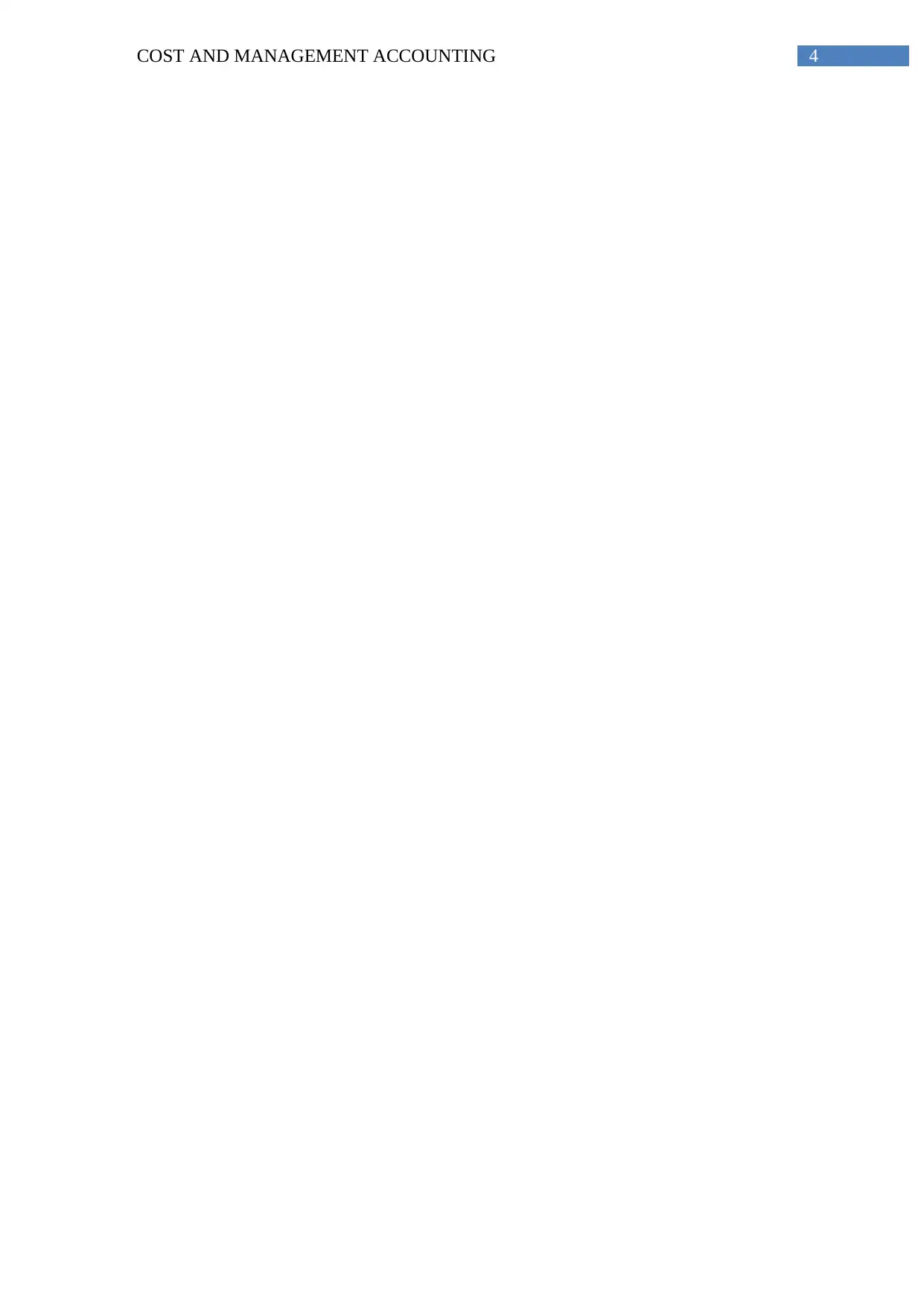
4COST AND MANAGEMENT ACCOUNTING
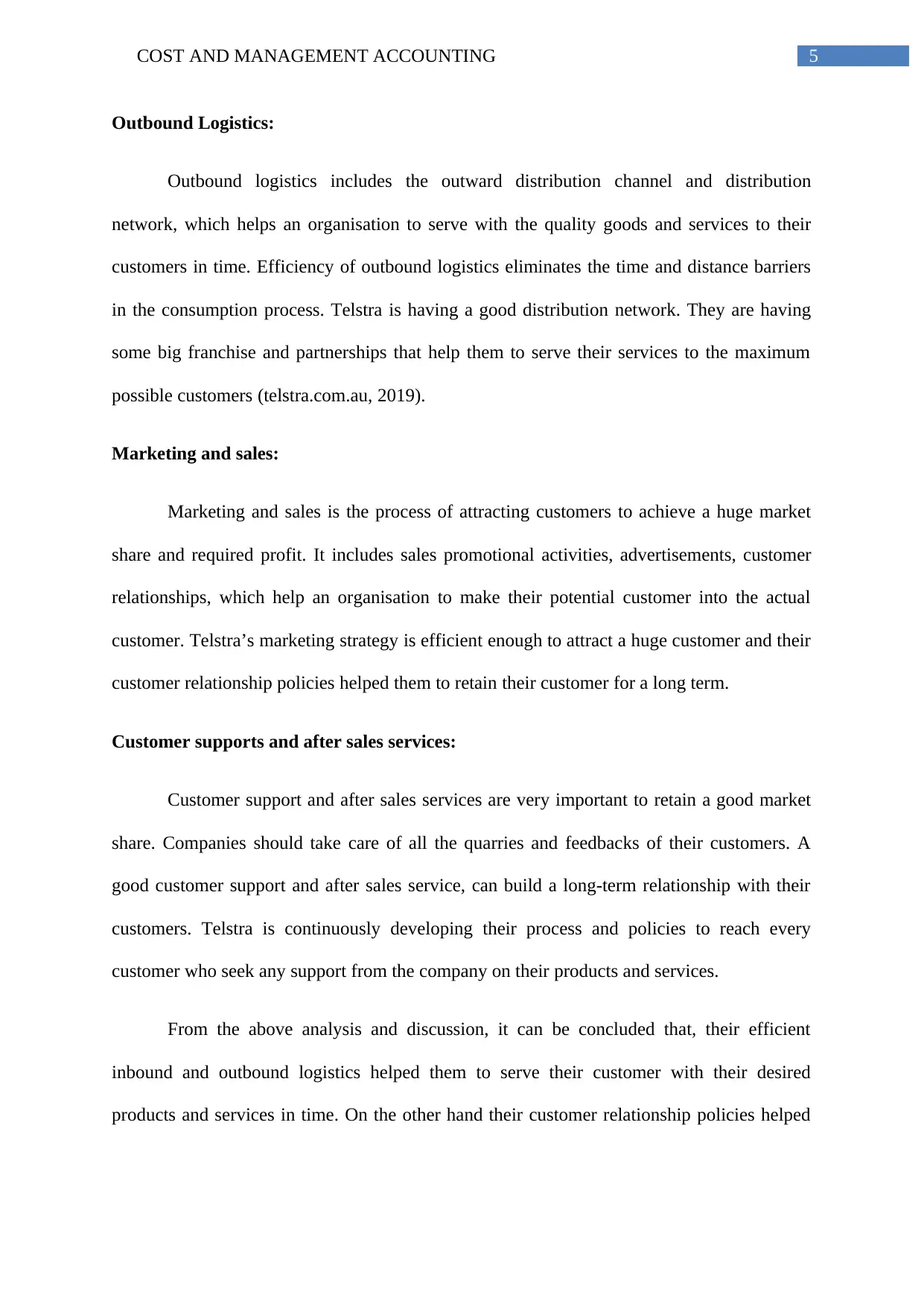
5COST AND MANAGEMENT ACCOUNTING
Outbound Logistics:
Outbound logistics includes the outward distribution channel and distribution
network, which helps an organisation to serve with the quality goods and services to their
customers in time. Efficiency of outbound logistics eliminates the time and distance barriers
in the consumption process. Telstra is having a good distribution network. They are having
some big franchise and partnerships that help them to serve their services to the maximum
possible customers (telstra.com.au, 2019).
Marketing and sales:
Marketing and sales is the process of attracting customers to achieve a huge market
share and required profit. It includes sales promotional activities, advertisements, customer
relationships, which help an organisation to make their potential customer into the actual
customer. Telstra’s marketing strategy is efficient enough to attract a huge customer and their
customer relationship policies helped them to retain their customer for a long term.
Customer supports and after sales services:
Customer support and after sales services are very important to retain a good market
share. Companies should take care of all the quarries and feedbacks of their customers. A
good customer support and after sales service, can build a long-term relationship with their
customers. Telstra is continuously developing their process and policies to reach every
customer who seek any support from the company on their products and services.
From the above analysis and discussion, it can be concluded that, their efficient
inbound and outbound logistics helped them to serve their customer with their desired
products and services in time. On the other hand their customer relationship policies helped
Outbound Logistics:
Outbound logistics includes the outward distribution channel and distribution
network, which helps an organisation to serve with the quality goods and services to their
customers in time. Efficiency of outbound logistics eliminates the time and distance barriers
in the consumption process. Telstra is having a good distribution network. They are having
some big franchise and partnerships that help them to serve their services to the maximum
possible customers (telstra.com.au, 2019).
Marketing and sales:
Marketing and sales is the process of attracting customers to achieve a huge market
share and required profit. It includes sales promotional activities, advertisements, customer
relationships, which help an organisation to make their potential customer into the actual
customer. Telstra’s marketing strategy is efficient enough to attract a huge customer and their
customer relationship policies helped them to retain their customer for a long term.
Customer supports and after sales services:
Customer support and after sales services are very important to retain a good market
share. Companies should take care of all the quarries and feedbacks of their customers. A
good customer support and after sales service, can build a long-term relationship with their
customers. Telstra is continuously developing their process and policies to reach every
customer who seek any support from the company on their products and services.
From the above analysis and discussion, it can be concluded that, their efficient
inbound and outbound logistics helped them to serve their customer with their desired
products and services in time. On the other hand their customer relationship policies helped
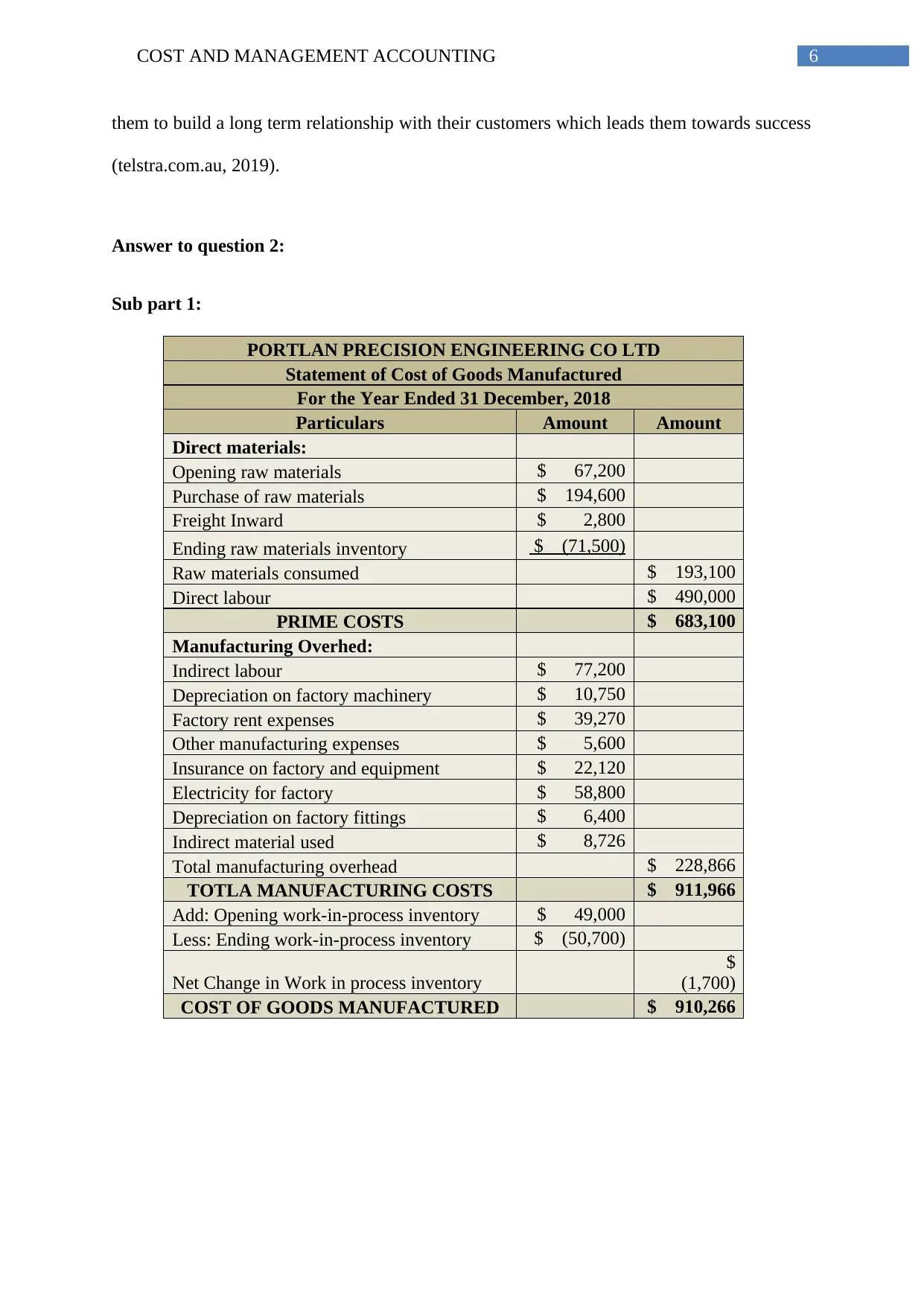
6COST AND MANAGEMENT ACCOUNTING
them to build a long term relationship with their customers which leads them towards success
(telstra.com.au, 2019).
Answer to question 2:
Sub part 1:
PORTLAN PRECISION ENGINEERING CO LTD
Statement of Cost of Goods Manufactured
For the Year Ended 31 December, 2018
Particulars Amount Amount
Direct materials:
Opening raw materials $ 67,200
Purchase of raw materials $ 194,600
Freight Inward $ 2,800
Ending raw materials inventory $ (71,500)
Raw materials consumed $ 193,100
Direct labour $ 490,000
PRIME COSTS $ 683,100
Manufacturing Overhed:
Indirect labour $ 77,200
Depreciation on factory machinery $ 10,750
Factory rent expenses $ 39,270
Other manufacturing expenses $ 5,600
Insurance on factory and equipment $ 22,120
Electricity for factory $ 58,800
Depreciation on factory fittings $ 6,400
Indirect material used $ 8,726
Total manufacturing overhead $ 228,866
TOTLA MANUFACTURING COSTS $ 911,966
Add: Opening work-in-process inventory $ 49,000
Less: Ending work-in-process inventory $ (50,700)
Net Change in Work in process inventory
$
(1,700)
COST OF GOODS MANUFACTURED $ 910,266
them to build a long term relationship with their customers which leads them towards success
(telstra.com.au, 2019).
Answer to question 2:
Sub part 1:
PORTLAN PRECISION ENGINEERING CO LTD
Statement of Cost of Goods Manufactured
For the Year Ended 31 December, 2018
Particulars Amount Amount
Direct materials:
Opening raw materials $ 67,200
Purchase of raw materials $ 194,600
Freight Inward $ 2,800
Ending raw materials inventory $ (71,500)
Raw materials consumed $ 193,100
Direct labour $ 490,000
PRIME COSTS $ 683,100
Manufacturing Overhed:
Indirect labour $ 77,200
Depreciation on factory machinery $ 10,750
Factory rent expenses $ 39,270
Other manufacturing expenses $ 5,600
Insurance on factory and equipment $ 22,120
Electricity for factory $ 58,800
Depreciation on factory fittings $ 6,400
Indirect material used $ 8,726
Total manufacturing overhead $ 228,866
TOTLA MANUFACTURING COSTS $ 911,966
Add: Opening work-in-process inventory $ 49,000
Less: Ending work-in-process inventory $ (50,700)
Net Change in Work in process inventory
$
(1,700)
COST OF GOODS MANUFACTURED $ 910,266
Paraphrase This Document
Need a fresh take? Get an instant paraphrase of this document with our AI Paraphraser
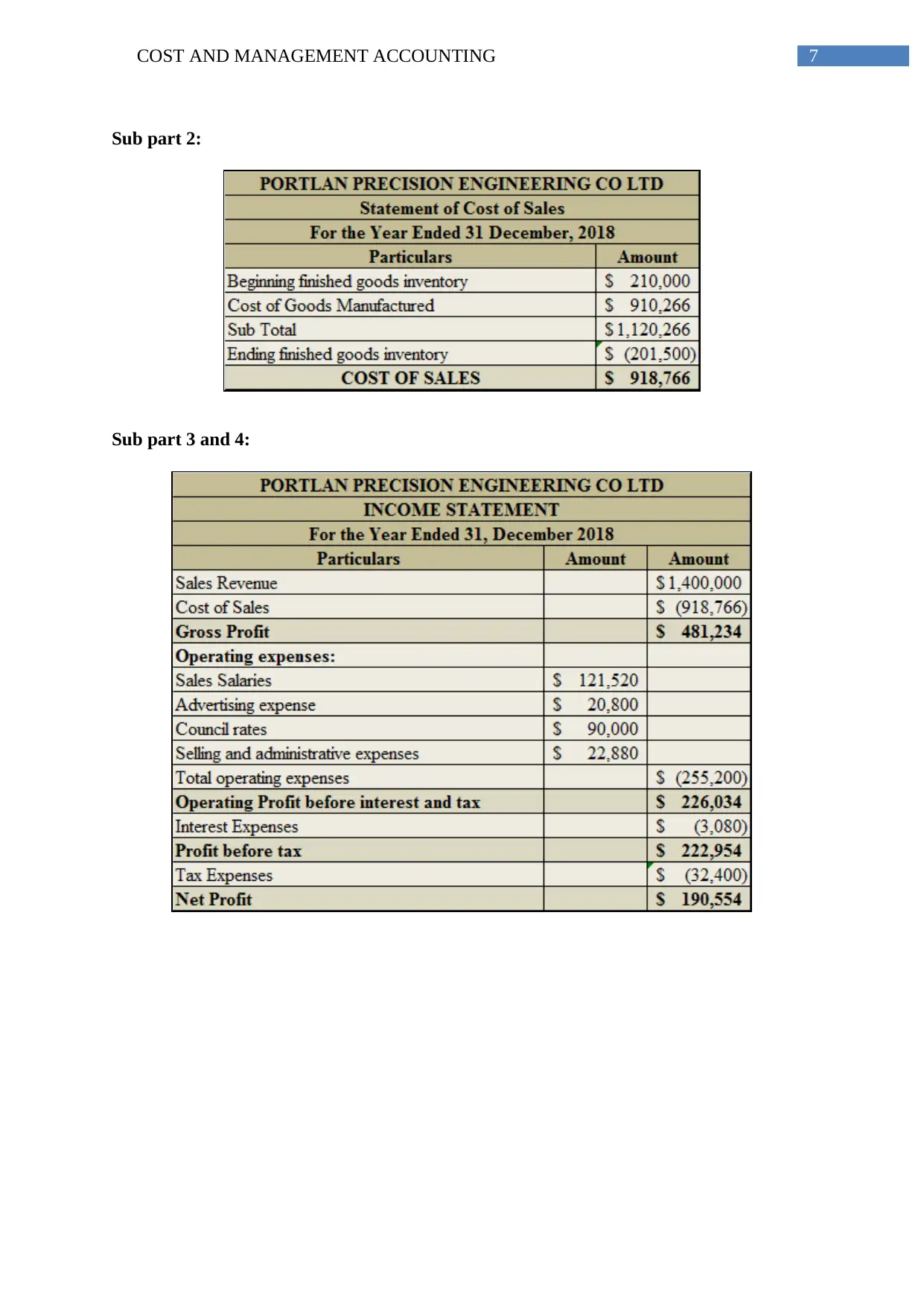
7COST AND MANAGEMENT ACCOUNTING
Sub part 2:
Sub part 3 and 4:
Sub part 2:
Sub part 3 and 4:
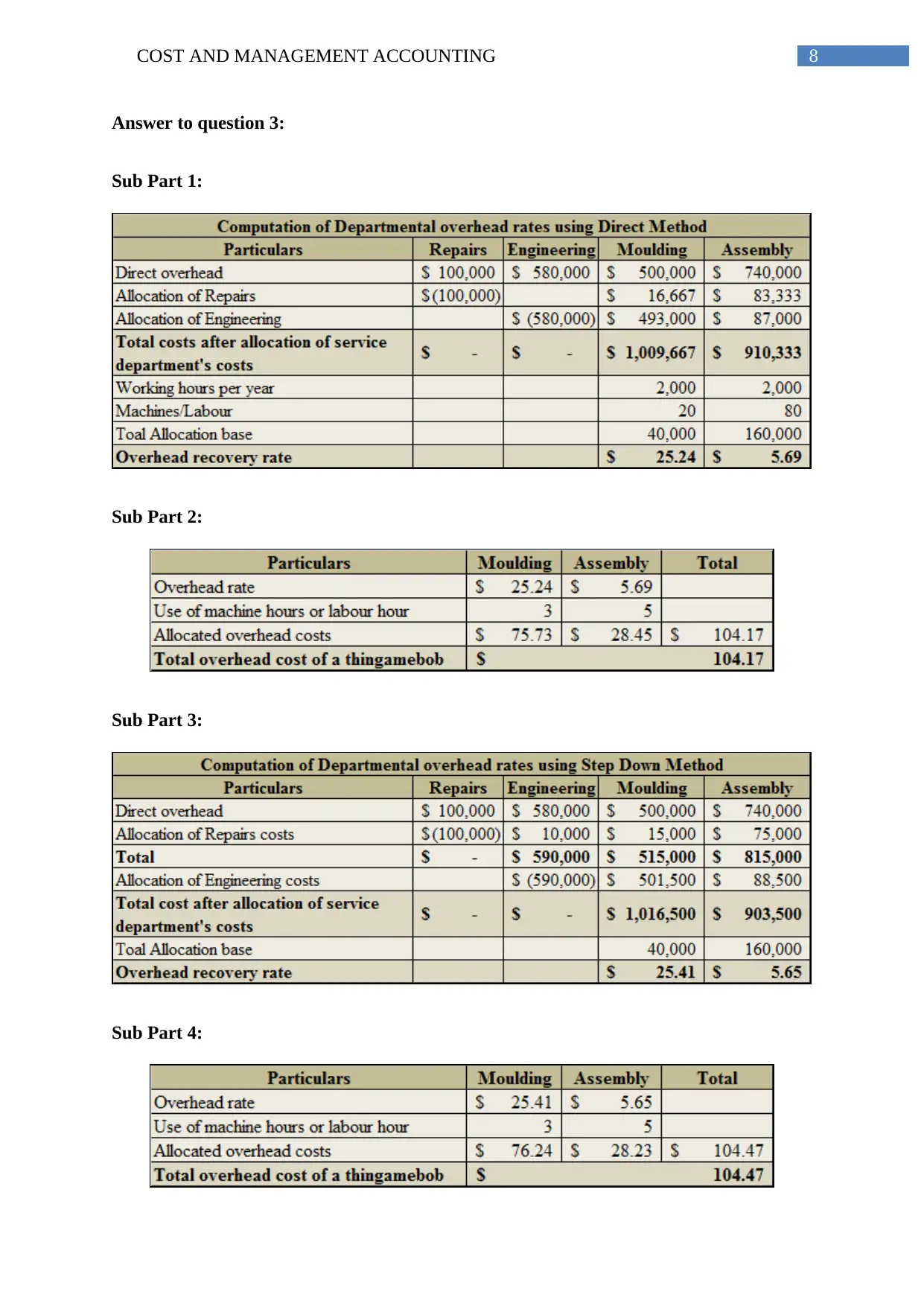
8COST AND MANAGEMENT ACCOUNTING
Answer to question 3:
Sub Part 1:
Sub Part 2:
Sub Part 3:
Sub Part 4:
Answer to question 3:
Sub Part 1:
Sub Part 2:
Sub Part 3:
Sub Part 4:
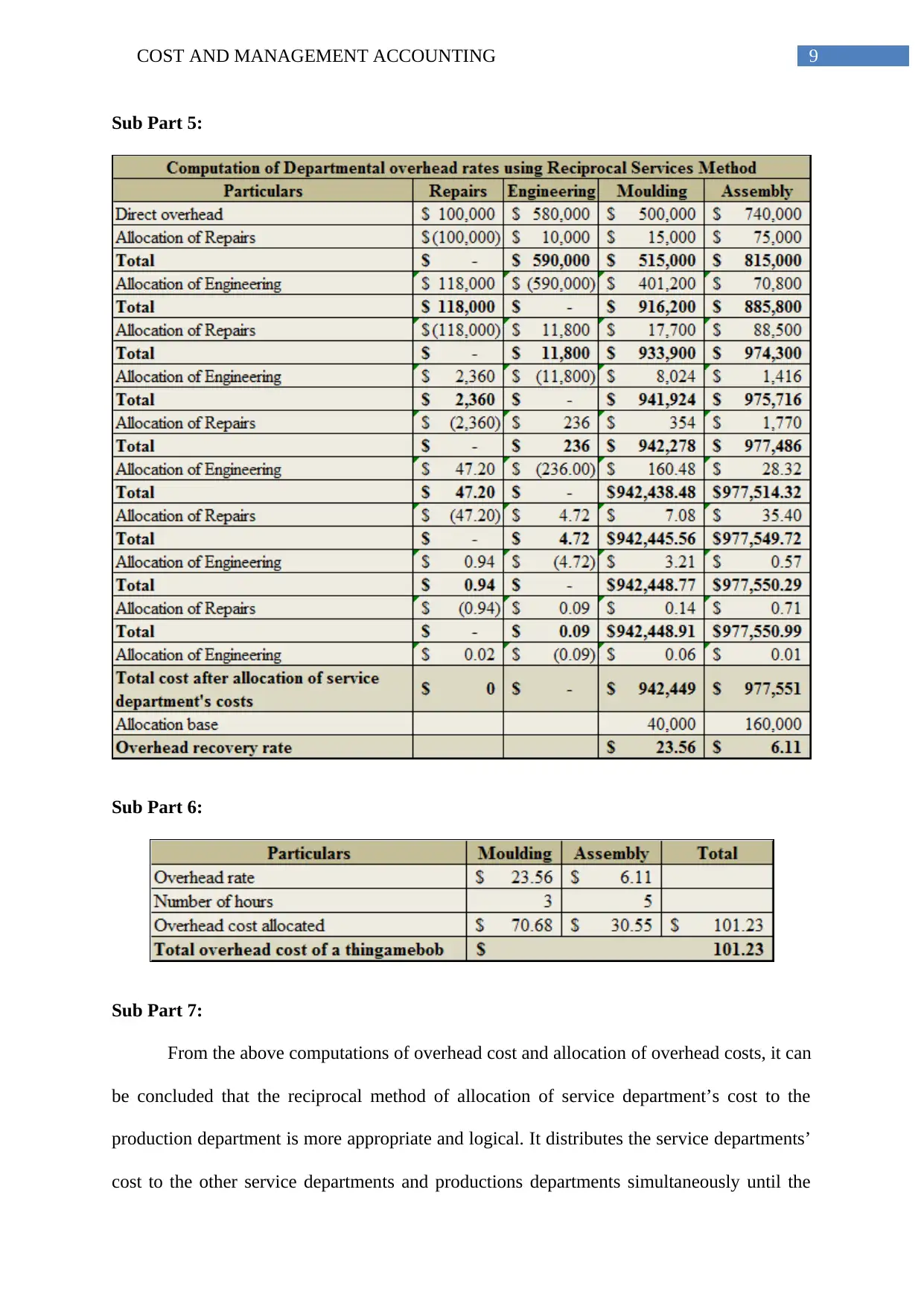
9COST AND MANAGEMENT ACCOUNTING
Sub Part 5:
Sub Part 6:
Sub Part 7:
From the above computations of overhead cost and allocation of overhead costs, it can
be concluded that the reciprocal method of allocation of service department’s cost to the
production department is more appropriate and logical. It distributes the service departments’
cost to the other service departments and productions departments simultaneously until the
Sub Part 5:
Sub Part 6:
Sub Part 7:
From the above computations of overhead cost and allocation of overhead costs, it can
be concluded that the reciprocal method of allocation of service department’s cost to the
production department is more appropriate and logical. It distributes the service departments’
cost to the other service departments and productions departments simultaneously until the
Secure Best Marks with AI Grader
Need help grading? Try our AI Grader for instant feedback on your assignments.
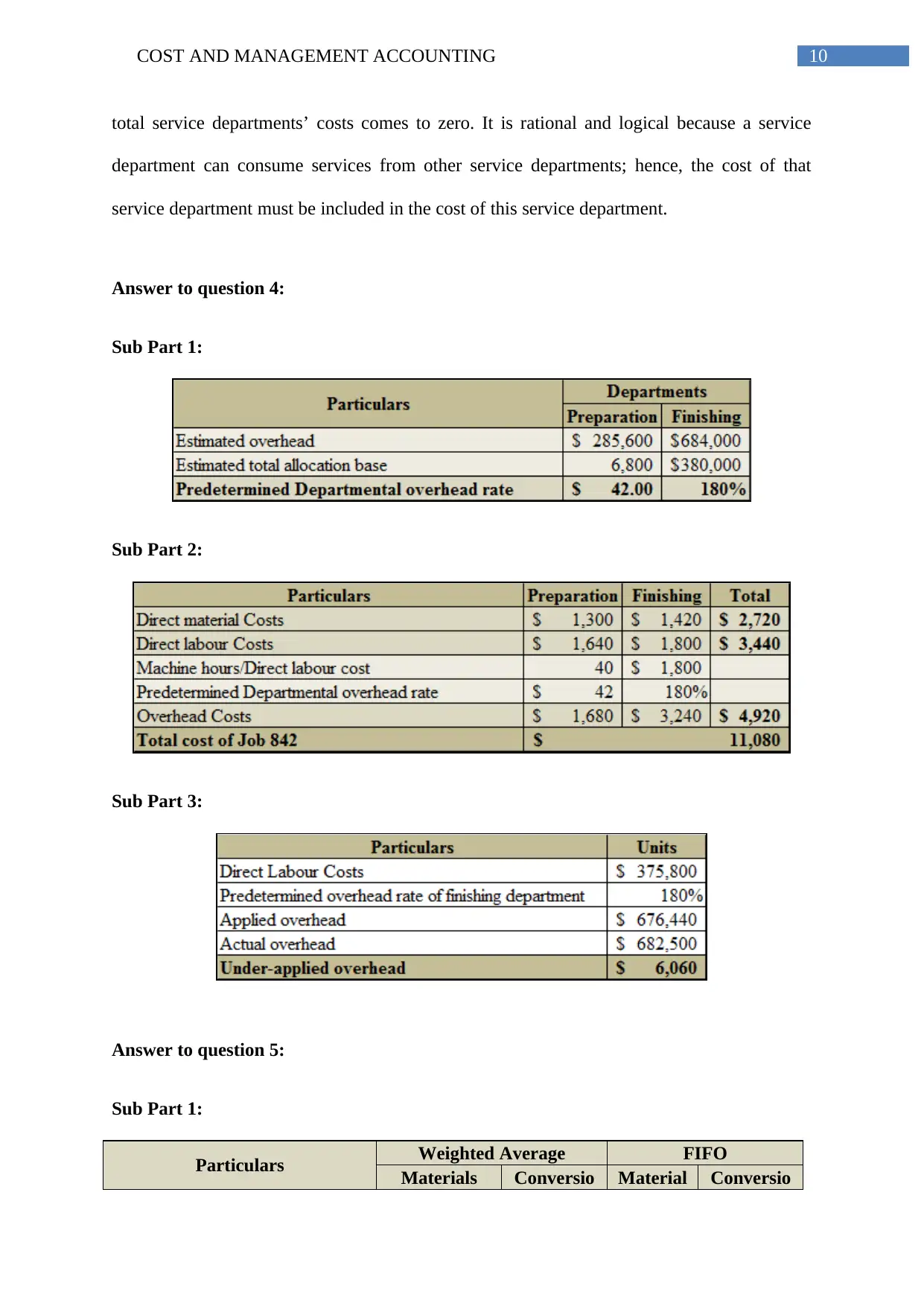
10COST AND MANAGEMENT ACCOUNTING
total service departments’ costs comes to zero. It is rational and logical because a service
department can consume services from other service departments; hence, the cost of that
service department must be included in the cost of this service department.
Answer to question 4:
Sub Part 1:
Sub Part 2:
Sub Part 3:
Answer to question 5:
Sub Part 1:
Particulars Weighted Average FIFO
Materials Conversio Material Conversio
total service departments’ costs comes to zero. It is rational and logical because a service
department can consume services from other service departments; hence, the cost of that
service department must be included in the cost of this service department.
Answer to question 4:
Sub Part 1:
Sub Part 2:
Sub Part 3:
Answer to question 5:
Sub Part 1:
Particulars Weighted Average FIFO
Materials Conversio Material Conversio
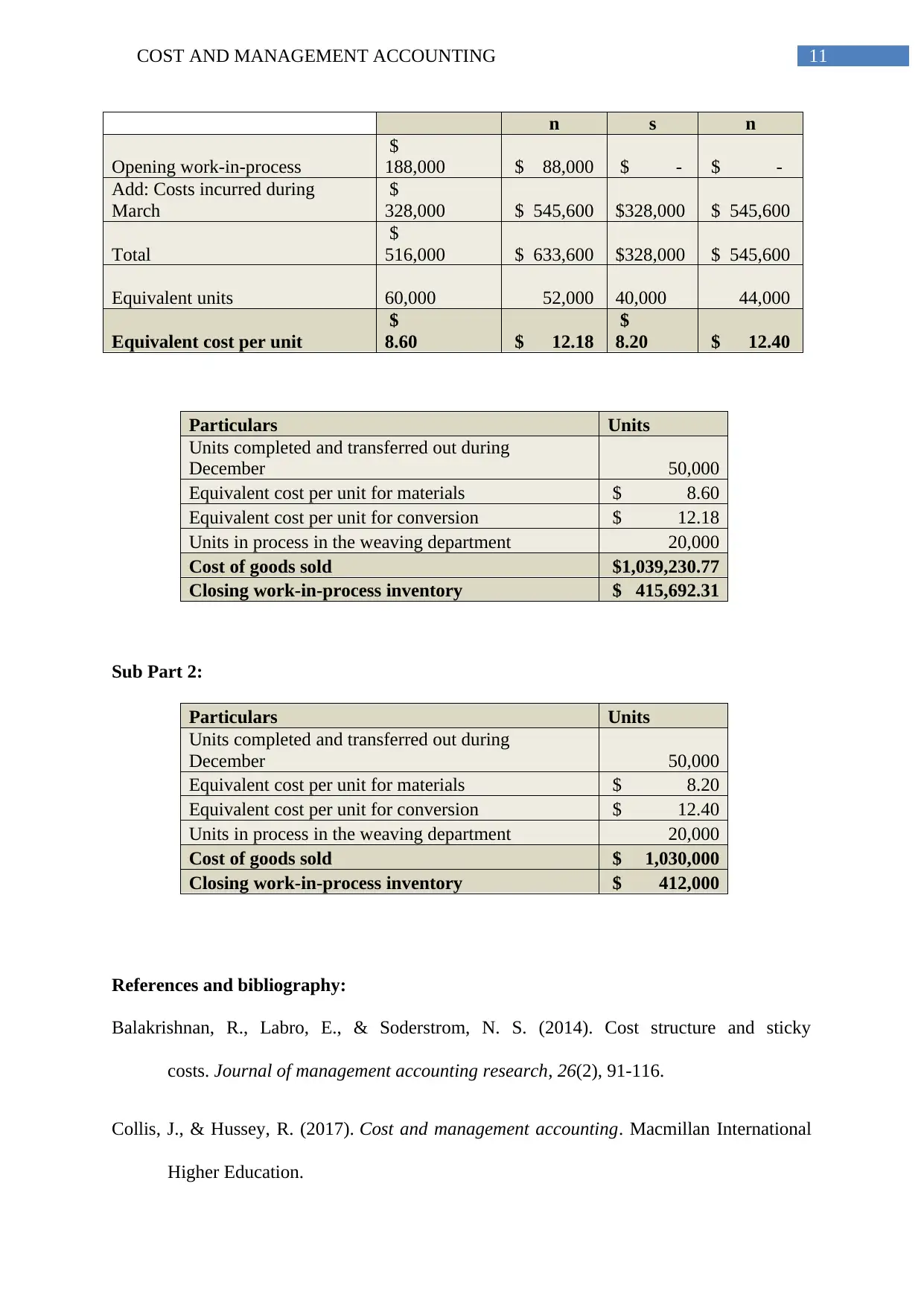
11COST AND MANAGEMENT ACCOUNTING
n s n
Opening work-in-process
$
188,000 $ 88,000 $ - $ -
Add: Costs incurred during
March
$
328,000 $ 545,600 $328,000 $ 545,600
Total
$
516,000 $ 633,600 $328,000 $ 545,600
Equivalent units 60,000 52,000 40,000 44,000
Equivalent cost per unit
$
8.60 $ 12.18
$
8.20 $ 12.40
Particulars Units
Units completed and transferred out during
December 50,000
Equivalent cost per unit for materials $ 8.60
Equivalent cost per unit for conversion $ 12.18
Units in process in the weaving department 20,000
Cost of goods sold $1,039,230.77
Closing work-in-process inventory $ 415,692.31
Sub Part 2:
Particulars Units
Units completed and transferred out during
December 50,000
Equivalent cost per unit for materials $ 8.20
Equivalent cost per unit for conversion $ 12.40
Units in process in the weaving department 20,000
Cost of goods sold $ 1,030,000
Closing work-in-process inventory $ 412,000
References and bibliography:
Balakrishnan, R., Labro, E., & Soderstrom, N. S. (2014). Cost structure and sticky
costs. Journal of management accounting research, 26(2), 91-116.
Collis, J., & Hussey, R. (2017). Cost and management accounting. Macmillan International
Higher Education.
n s n
Opening work-in-process
$
188,000 $ 88,000 $ - $ -
Add: Costs incurred during
March
$
328,000 $ 545,600 $328,000 $ 545,600
Total
$
516,000 $ 633,600 $328,000 $ 545,600
Equivalent units 60,000 52,000 40,000 44,000
Equivalent cost per unit
$
8.60 $ 12.18
$
8.20 $ 12.40
Particulars Units
Units completed and transferred out during
December 50,000
Equivalent cost per unit for materials $ 8.60
Equivalent cost per unit for conversion $ 12.18
Units in process in the weaving department 20,000
Cost of goods sold $1,039,230.77
Closing work-in-process inventory $ 415,692.31
Sub Part 2:
Particulars Units
Units completed and transferred out during
December 50,000
Equivalent cost per unit for materials $ 8.20
Equivalent cost per unit for conversion $ 12.40
Units in process in the weaving department 20,000
Cost of goods sold $ 1,030,000
Closing work-in-process inventory $ 412,000
References and bibliography:
Balakrishnan, R., Labro, E., & Soderstrom, N. S. (2014). Cost structure and sticky
costs. Journal of management accounting research, 26(2), 91-116.
Collis, J., & Hussey, R. (2017). Cost and management accounting. Macmillan International
Higher Education.
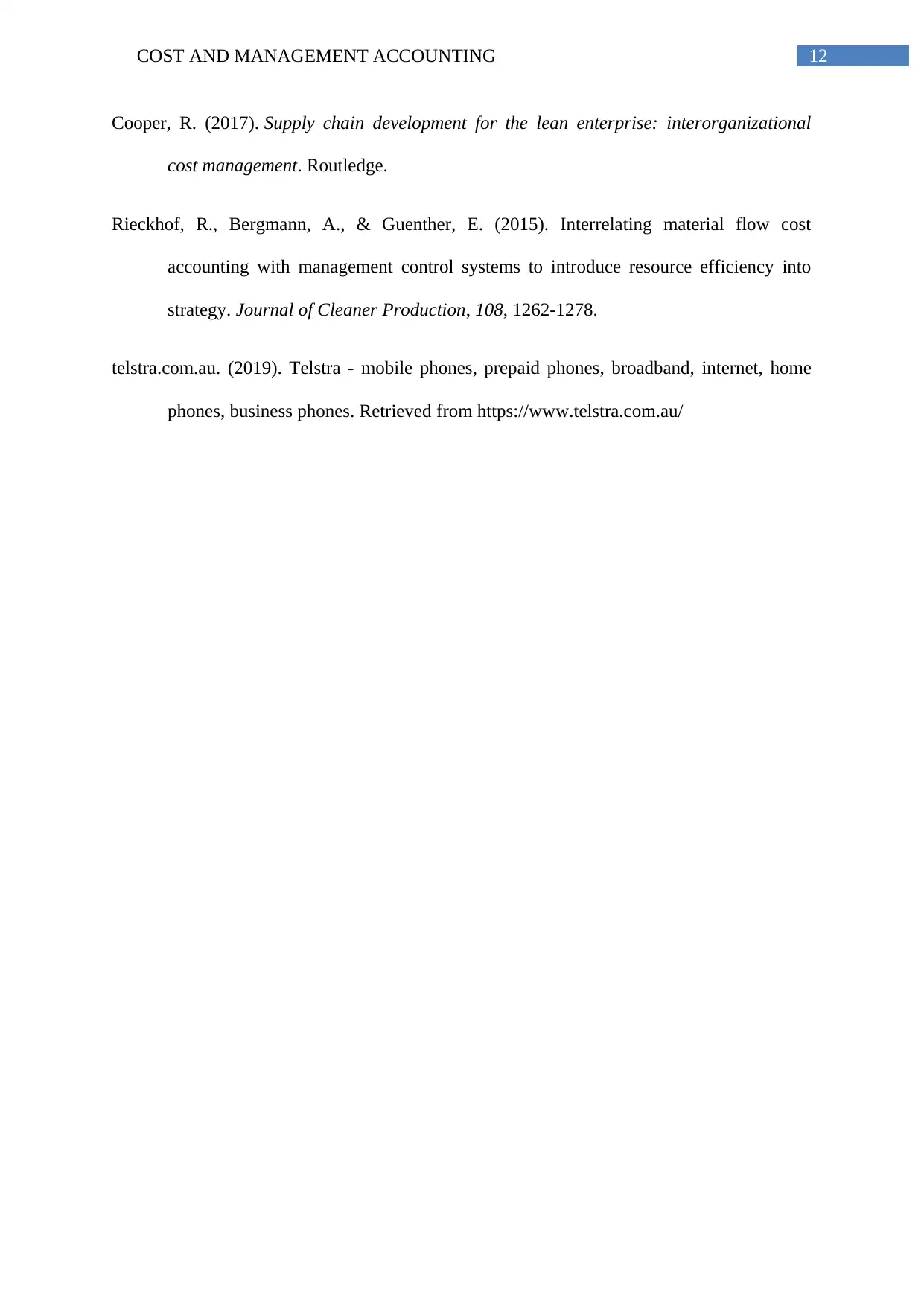
12COST AND MANAGEMENT ACCOUNTING
Cooper, R. (2017). Supply chain development for the lean enterprise: interorganizational
cost management. Routledge.
Rieckhof, R., Bergmann, A., & Guenther, E. (2015). Interrelating material flow cost
accounting with management control systems to introduce resource efficiency into
strategy. Journal of Cleaner Production, 108, 1262-1278.
telstra.com.au. (2019). Telstra - mobile phones, prepaid phones, broadband, internet, home
phones, business phones. Retrieved from https://www.telstra.com.au/
Cooper, R. (2017). Supply chain development for the lean enterprise: interorganizational
cost management. Routledge.
Rieckhof, R., Bergmann, A., & Guenther, E. (2015). Interrelating material flow cost
accounting with management control systems to introduce resource efficiency into
strategy. Journal of Cleaner Production, 108, 1262-1278.
telstra.com.au. (2019). Telstra - mobile phones, prepaid phones, broadband, internet, home
phones, business phones. Retrieved from https://www.telstra.com.au/
1 out of 13
Your All-in-One AI-Powered Toolkit for Academic Success.
+13062052269
info@desklib.com
Available 24*7 on WhatsApp / Email
![[object Object]](/_next/static/media/star-bottom.7253800d.svg)
Unlock your academic potential
© 2024 | Zucol Services PVT LTD | All rights reserved.





